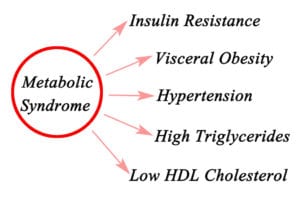
Obesity affected 13% of adults globally in 2016 and obesity and metabolic disease are on the rise [1]. Obesity increases your risk for a plethora of conditions, including metabolic abnormalities and metabolic syndrome, high blood pressure, and type 2 diabetes [2] [3].
The ketogenic diet is one of the popular diets touted for improving metabolism via different mechanisms, such as limiting carbohydrates. Some research suggests lowering carbs might benefit those with obesity [4].
When you reduce carbs and increase fat, your body enters a metabolic state called ketosis, where you turn fat into molecules called ketones. Your brain and body become more adapted and efficient at burning fat and ketones for energy after a few days or weeks of ditching carbs on a ketogenic diet.
What is Metabolic Syndrome?
 Metabolic syndrome refers to the five common risk factors for type 2 diabetes, heart disease, and obesity:
Metabolic syndrome refers to the five common risk factors for type 2 diabetes, heart disease, and obesity:
- High waist-to-hip-ratio
- High blood pressure
- High blood sugar levels
- High levels of LDL (bad) cholesterol
- Low levels of HDL (good) cholesterol [5].
How Does Keto Benefit the Metabolism and Metabolic Disease?
The standard American diet is carb-heavy, and science shows a high-carb diet can constantly elevate insulin and blood sugar levels, which can reduce the body’s ability to use insulin properly [6]
The ketogenic diet benefits the metabolism in numerous ways. Going keto lowers insulin levels, which can be helpful for blood sugar management and insulin sensitivity. Insulin is a digestive hormone that helps you store sugar in your cells. It’s also called the fat-storage hormone since it prompts you to hold on to your fat stores.
When you’re not consuming too many carbs, you won’t require as much insulin, which can be beneficial for metabolism and fat loss [7]. People with metabolic syndrome have issues with insulin and blood sugar, so getting off the blood sugar rollercoaster that comes along with a high-carb diet can be pivotal.
The risk factors of metabolic disease can be improved or eliminated with the right lifestyle and nutritional modifications. Keto diets have been shown to effectively reduce insulin levels, particularly for those with prediabetes and type 2 diabetes.
High insulin levels and insulin resistance can lead to a flurry of health issues, including inflammation, fat gain, and high triglyceride levels.
One study revealed a 75% improvement in insulin sensitivity along with blood sugar drops after just 2 weeks on a keto diet [8]. Another 16-week study showed blood sugar levels dropped by 16%, and 7 of 21 participants were able to stop diabetic medication [9]. Other animal and human studies found improvements in total cholesterol and triglycerides with a ketogenic diet [10].
Can Going Keto Help with Weight Loss?
The research on keto and weight loss is promising. Studies show a keto diet might help you lose fat, improve various markers of disease, and preserve muscle mass [11] [12] [13].
When compared to a low-fat diet, studies reveal a keto diet might be more effective for weight loss, even after matching total calorie intake [14].
Studies also highlight how keto can reduce appetite and food intake. With keto, you eliminate or limit most fattening, carb-heavy, and sugary foods, so you don’t necessarily have to count your calories [15] [16]. Be mindful cutting your calories too much can slow your metabolism and shift your body into starvation mode.
To summarize, a keto diet improves weight loss in different ways, such as:
- Higher protein intake
- Appetite-suppressant
- Improved insulin sensitivity
- Increased fat burning
- Decreased fat storage
Concluding Thoughts
The research is clear; ketogenic diets have been shown to help with weight loss and metabolic disease. If you’re obese or dealing with metabolic syndrome, you might try a ketogenic diet to improve your health. It’s up to you whether you’d like to go keto or not. You won’t know the effects the diet can have until you give it a try.
Particularly if you have medical concerns and metabolic syndrome, you might choose to work with one of the keto-friendly doctors listed for you here on ketogenic.com. Always speak to your healthcare practitioner or doctor before starting any new dietary change. You can also find a supportive community and check out the many keto success stories for inspiration here at ketogenic.com!
Are you going keto to lose weight or help with metabolic disease?
Share your experience with the ketogenic diet, weight loss, and metabolic disease.
References
World Health Organization. Obesity and Overweight. Obesity and overweight (who.int)
Rochlani, Y., Pothineni, N. V., Kovelamudi, S., & Mehta, J. L. (2017). Metabolic syndrome: Pathophysiology, management, and modulation by natural compounds. The Adv Cardiovasc Dis, 11(8), 215-225. DOI: 10.1177/1753944717711379
Saklayen, M. G. (2018). The global epidemic of the metabolic syndrome. Curr Hypertens Rep, 20(2), 12. DOI: 10.1007/s11906-018-0812-z
Paoli, A., Rubini, A., Volek, J. S., & Grimaldi, K. A. (2013). Beyond weight loss: A review of the therapeutic uses of very-low-carbohydrate (ketogenic) diets. European Journal of Clinical Nutrition, 67(8), 789-796. DOI: 10.1038/ejcn.2013.116
Han, T. S., & Lean, M. E. J. (2016). A clinical perspective of obesity, metabolic syndrome, and cardiovascular disease. JRSM Cardiovasc Dis, DOI: 10.1177/2048004016633371
Freeman, A. M. Insulin Resistance. Insulin Resistance – StatPearls – NCBI Bookshelf (nih.gov)
Bolla, A. M., Caretto, A., Laurenzi, A., Scavini, M., & Piemonti, L. (2019). Low-carb and ketogenic diets in type 1 and type 2 diabetes. Nutrients, 11(5), 962. DOI: 10.3390/nu11050962
Boden, G., Sargrad, K., Homko, C., Mozzoli, M., & Stein, T. P. (2005). Effect of a low-carbohydrate diet on appetite, blood glucose levels, and insulin resistance in obese patients with type 2 diabetes. Ann Intern Med, 142(6), 403-411. DOI: 10.7326/0003-4819-142-6-200503150-00006
Westman, E. C., Yancy Jr, W. S., Mavropoulos, J. C., Marquart, M., & McDuffie, J. R. (2008). The effect of a low-carbohydrate, ketogenic diet versus a low-glycemic index diet on glycemic control in type 2 diabetes mellitus. Nutr Metab (Lond), DOI: 10.1186/1743-7075-5-36
Kosinski, C., & Jornayvaz, F. R. (2017). Effects of ketogenic diets on cardiovascular risk factors: Evidence from animal and human studies. Nutrients, 9(5), 517. DOI: 10.3390/nu9050517
Paoli, A., Rubini, A., Volek, J. S., & Grimaldi, K. A. (2013). Beyond weight loss: A review of the therapeutic uses of very-low-carbohydrate (ketogenic) diets. European Journal of Clinical Nutrition, 67(8), 789-796. DOI: 10.1038/ejcn.2013.116
Ludwig, D. S. (2019). The ketogenic diet: Evidence for optimism but high-quality research is needed. Journal of Nutrition, 150(6), 1354-1359. DOI: 10.1093/jn/nxz308
Bueno, N. B., De Melo, I. S. V., De Oliveira, S. L., Ataide, T. D. (2013). Very-low-carbohydrate ketogenic diet v. low-fat diet for long-term weight loss: A meta-analysis of randomized controlled trials. British Journal of Nutrition, 110(7), 1178-1187. DOI: 10.1017/S0007114513000548
Brehm, B. J., Seeley, R. J., Daniels, S. R., D’Alessio, D. A. (2003). A randomized trial comparing a very low carbohydrate diet and a calorie-restricted low-fat diet on body weight and cardiovascular risk factors in healthy women. The Journal of Clinical Endocrinology & Metabolism, 88(4), 1617-1623. https://doi.org/10.1210/jc.2002-021480
Paoli, A., Bosco, G., Camporesi, E. M., & Mangar, D. (2015). Ketosis, ketogenic diet, and food intake control: A complex relationship. Frontiers in Psychology, DOI: 10.3389/fpsyg.2015.00027
Deemer, S. E., Plaisance, E, P., & Martins, C. (2020). Impact of ketosis on appetite regulation: A review. Nutr Res, DOI: 10.1016/j.nutres.2020.02.010









